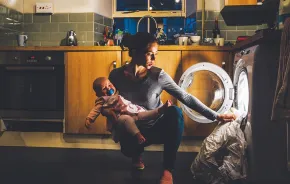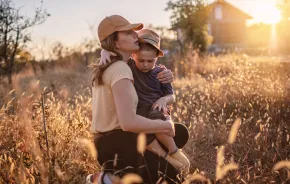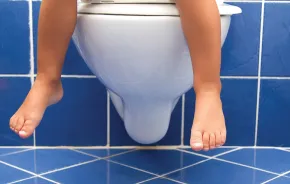
Giacomo Bono, Ph.D., is an associate professor at California State University, Dominguez Hills, and the co-author of “Making Grateful Kids: The Science of Building Character.” In the book, Bono and Jeffrey Froh, Psy.D., provide research-backed evidence for how gratitude benefits child development, along with practical advice for parents on how to nurture gratitude in their kids. Comparing gratitude to a miracle drug, one that enhances happiness and overall life satisfaction, the pair demonstrates how being grateful helps our kids become actively contributing members of society.
As a 9-year-old, Bono suffered a life-threatening case of encephalitis (inflammation of the brain) that required weeks of hospitalization. As his weakened body battled to survive, Bono slipped into a coma. When he woke up, his concerned family gathered around him in a circle of love and support. Bono credits his family’s persistent encouragement for helping him summon the strength to recover, and it was the driving force behind his commitment to explore the power of human connection.
Now, as a father of two boys (Alex, 12, and Dario, 15), Bono is a keen proponent of the positive effects loving, supportive relationships have on child development. Speaking with ParentMap, Bono shared his views on why love and gratitude are so important.
How did your childhood illness fuel your interest in positive youth development?
On a very primitive level, it taught me that life is hard and we have to be there for each other. The pain and concern on my family’s faces really made me realize that what was happening was serious. I remember that emotional information; it really did empower me. I had the attitude that I could get through it. To this day, I am awed by the infinite value of every human. Belief in people is powerful, and I very much see and appreciate that. We all need love, appreciation and validation. There’s so much more complexity to developing humans than adults understand.
How does gratitude affect our children’s development of prosocial behaviors (helping, sharing and comforting)?
By living and promoting a life full of gratitude, we become skilled at appreciating the value in higher-quality relationships. Gratitude is a gateway to social skills and increases social-emotional competence. As our kids are developing their own lives, they pick their friends, and part of prosocial development involves choosing friends who show love toward you and who intrinsically care for you, instead of using you for popularity or status.
Ultimately, gratitude helps nudge our kids into seeking out peers who get them and who help them have a more satisfying life. We want our kids to become good people, good friends and good citizens. We have to give them a voice and let them contribute to decision-making.
Why is it important to step back and assess the deeper meaning behind gifts and services we receive from others?
When somebody is kind to us, it’s very easy to just say thanks and be done with it. Thanking a person is part of this politeness script that we have, but the times when good things happen to us really are learning moments. Instead of being on automatic, we should pause to appreciate the meaning and intention behind what a person has done for us. Acts of kindness are done with intention by someone who has noticed us and who believes in us. They put in time and effort, and that matters a lot; appreciate that they see you as having something special that they hope to grow, that what you have is special to the world. It’s part of a wider web of how we support each other and inspire each other toward purpose, and how we contribute to society.
In the most difficult times, how can we help our kids seek silver linings?
We always have a choice in how we see things, even when we’re going through significant challenges. Encourage patience in your kids and see if there’s another way to reframe whatever they’re going through. Recognize there’s always another way to look at things, but we also have to validate their feelings by listening, acknowledging and being supportive. Trust involves hearing what their needs are and valuing their contribution to the world. What’s most important for our kids is being able to see on their own the things that matter most in life.











